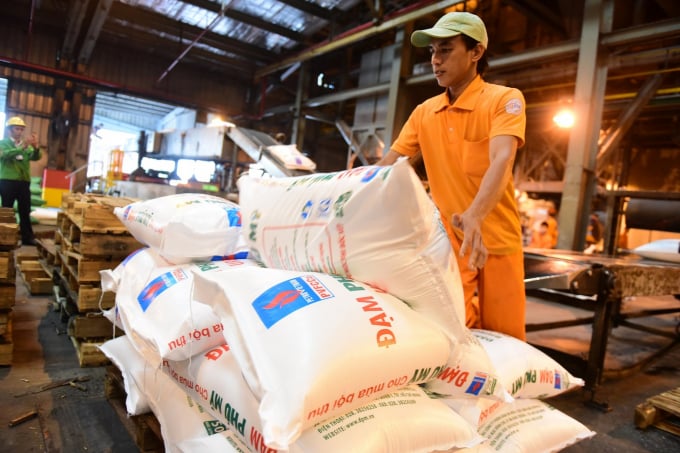May 21, 2025 | 10:14 GMT +7
May 21, 2025 | 10:14 GMT +7
Hotline: 0913.378.918
May 21, 2025 | 10:14 GMT +7
Hotline: 0913.378.918

The MARD’s goal by 2025 is to strive for at least a 90% satisfaction rate of people and businesses dealing with administrative procedures. Photo: Dong Thai.
In order to synchronously and effectively reform regulations on administrative procedures related to people, businesses, and internal administrative procedures in the field of agriculture and rural development, the MARD in recent years has reviewed, reduced and simplified business conditions, dossier composition, administrative procedures based on the application of information technology.
By 2025, the MARD will reduce and simplify at least 20% of regulations and reduce at least 20% of the cost of complying with regulations on agribusiness in documents that are in effect until the end of May 31st, 2020.
The goal set out by the MARD is to digitize the results of administrative procedures that are still valid with the value of use falling under the jurisdiction of the central government to reach a minimum rate of 40%.
In the 2021-2025 period, the digitization will increase at least 20% each year until the rate reaches 100% to guarantee the connection and data sharing regarding the settlement of administrative procedures in the e-platform.
The MARD’s goal is to strive for at least a 90% satisfaction rate of people and businesses dealing with administrative procedures.
In order to realize these goals, the MARD has actively performed many tasks:
Firstly, strictly control the promulgation of regulations on administrative procedures related to people and businesses, ensuring that newly issued administrative procedures are simple, easy to understand, and easy to execute.
The focus is on administrative procedures in the following areas: plant protection, animal husbandry, agro-forestry-fishery product quality control, animal health, fisheries, and other fields with high transaction frequency.
Secondly, review and assess administrative procedures during the implementation process; eliminate cumbersome and overlapping procedures that can be easily exploited for corruption and cause difficulties for people and businesses; remove unnecessary, unreasonable dossier composition; integrate and reduce unnecessary forms, declarations and papers with duplicate information content (based on the application of digital technologies and available databases).
Thirdly, reduce and simplify regulations related to business activities; eliminate illegal, unnecessary, and unreasonable regulations; successfully organize the Program "Reducing and simplifying regulations related to business activities in the 2020-2025 period".
Fourthly, carry out inspection, make statistics and simplify internal administrative procedures among state administrative agencies related to the field of agriculture and rural development.
Fifthly, regularly update and publicize administrative procedures on the One-door department on the website of the Ministry and its units, the Ministry's Public Service Portal and the One-door Information System, creating favorable conditions for people and businesses; complete the renovation and implementation of the one-door mechanism, interlocking one-door mechanism, and one-door ASEAN.
The MARD aims to have 100% of administrative procedures with financial obligations implemented online by 2030; at least 90% of administrative procedures are provided online at levels 3 and 4; complete the integration and data update on the National Public Service Portal.
The rate of online processing applications at levels 3 and 4 out of the total number of applications will be at least 80%. The satisfaction rate of people and businesses regarding administrative procedures in the field of agriculture and rural development will be at least 95%.
Translated by Samuel Pham

(VAN) Dong Thap farmers attained an average profit margin of 64% during the summer-autumn 2024 crop (first season), while An Giang and Kien Giang farmers followed with 56% and 54%, respectively.

(VAN) As a doctoral student doing research on renewable energy and electrification at Harvard University, the author shares his musings on electricity, nature, and countryside memories.

(VAN) The decree on Extended Producer Responsibility (EPR) ensures transparent management and disbursement of support funds, avoiding the creation of a “give-and-take” mechanism.

(VAN) Hue City rigorously enforces regulations regarding marine fishing and resource exploitation, with a particular emphasis on the monitoring of fishing vessels to prevent illegal, unreported, and unregulated (IUU) fishing.

(VAN) Hanoi People's Committee has issued a plan on reducing greenhouse gas emissions in the waste management sector with 2030 vision.

(VAN) Vietnam's draft amendment to Decree No. 156 proposes a mechanism for medicinal herb farming under forest canopies, linking economic development to population retention and the sustainable protection and development of forests.

(VAN) In reality, many craft village models combined with tourism in Son La have proven effective, bringing significant economic benefits to rural communities.